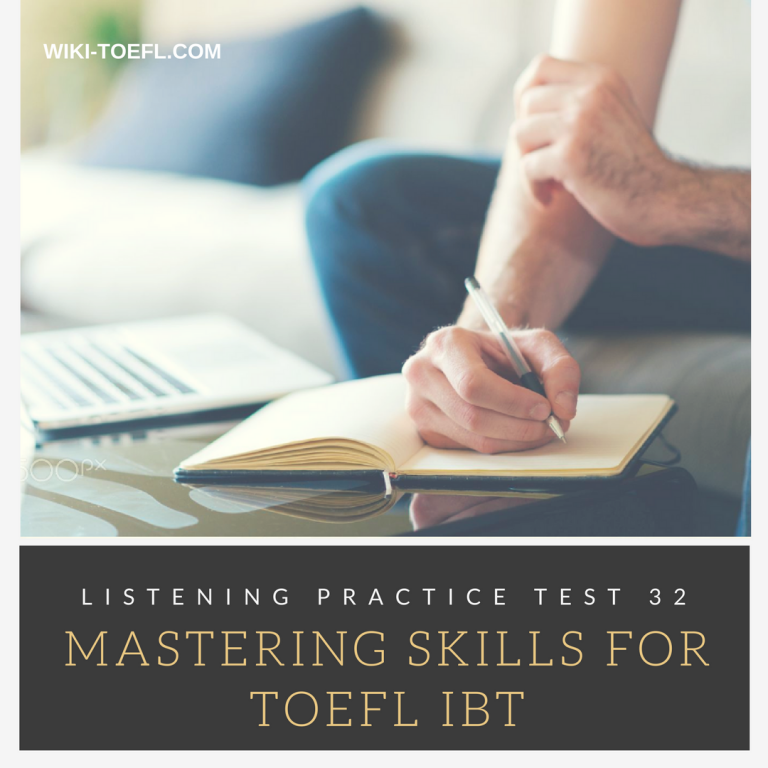TOEFL IBT PRACTISE TEST 32 FROM MASTERING SKILLS FOR TOEFL IBT
*Note: Comment below if you need the answer key from us. If you have any concerns, please comment below!
Listen to the lecture in biology class:
1.What is the main topic of the lecture?
- Why sharks are probably solitary hunters
- How sharks send messages to each other
- The differences between male and female sharks
- The hunting patterns and behaviors of sharks
2. Listen again the lecture to the part of the lecture. Then answer the question:
What does the professor mean when he say that?
- Sharks and wolves have many similar characteristics.
- Sharks may actually hunt more like wolves than leopards.
- Researchers found that sharks did not always hunt in packs.
- Scientists are starting to learn about solitary hunting behavior in sharks.
3.What is the professor’s attitude toward the researchers who worked around Cocos Island?
- He admires them for their work.
- He does not understand why they did it.
- He thinks it was not worth the danger.
- He does not believe they actually did it.
4. According to the passage, why do old sharks let young sharks hunt first?
- To make sure they get enough to eat
- To allow them to gain experience
- To learn new techniques from them
- To get food remains from them
5.How does the professor organize the information about tracking sharks that he presents to the class?
- He gives information about the difficulties of tracking the sharks.
- He explains the process and the information scientists learn from it.
- He describes why it is important to track the sharks.
- He tells the students about his own experience tracking sharks.
6.What can be inferred about whales?
- They are not as intelligent as sharks.
- They tend to swim in unfamiliar areas.
- They cannot defend themselves against sharks.
- They are one type of sharks’ prey.
Listen to the lecture in a history class ( Track 84)
7. What is the main topic of the lecture?
- The influence of trade on the Venetian Republic
- How wars with the Genoese led to the decline of Venice
- The ways that Venice overcame problems with trade
- Why trade was unimportant in the Venetian Republic
8. Why does the professor mention Rome?
- To introduce Venice’s primary competitor
- To add that Rome was the strongest empire
- To emphasize the long history of Venice
- To compare the Roman Empire with that of Venice
9. How did the defeat of the Normans benefit the Venetians?
- It provided Venice with additional territory.
- It resulted in an alliance with Byzantine.
- It gave Venice control of northern
- It helped Venice gain international
10. What does the professor mean when she say this?
- She wants to remind the students that the Byzantine empire was unjust.
- She wants to give another reason why tensions grew between Byzantine and Venice
- She thinks it was unfair that Venice grew antagonistic toward Byzantine
- She is proposing that Venice became rich by repressing Byzantine empire.
11.Listen again to part of the lecture. Thenanswer the question.
Why does the professor say this:
- She wants the students to understand the effects of the Genoese influence.
- She wants to point out that the Byzantines took over the monopoly.
- She is explaining that the Venetians were not affected by the Genoa-Byzantine alliance.
- She is detailing how the Genoese brought the Venetian Republic down.
12. Based on the information from the lecture, indicate whether or not each event occured in the Venetian Republic. Place a checkmark in the correct box:
| Yes | No | |
| The Venetian Republic was invaded by the Normans | ||
| The Venetian Republic became trade partners with the Genosese | ||
| The Venetian Republic defeated the Genoese in 1381 | ||
| The Venetian Republic allied with the Genoa against the Byzantine Empires | ||
Listen to a conversation between a student and a university employee.
13. What problem does the students have?
- She needs to file a police report for her stolen laptop.
- She needs help in order to replace her computer,
- She wants a loan to pay for a computer
- She cannot figure out how to order a new laptop
14. What is the student’s attitude toward her financial aid package?
- She is satisfied with
- She thinks it is unfair.
- She thinks it is a mistake.
- She is confused by the amount.
15. Listen again to part of the conversation.
Then answer the question. Why does the man say this:
- He wants to find out what the problem is.
- He does not think the student has a reason to ask for aid.
- He is trying to figure out the mistake in the
- He is curious about the student life at the university.
16. How can the Computer Purchase Program help the student?
- She can get a job with the university to pay off her
- She can order a brand new computer from any
- She can receive a discount on a new computer,
- She can get a new computer for free from the university.
- What can be inferred about the student’s last computer?
- It never worked properly.
- It was the first computer she ever owned.
- Her sister used it during college.
- She did rot take care of

